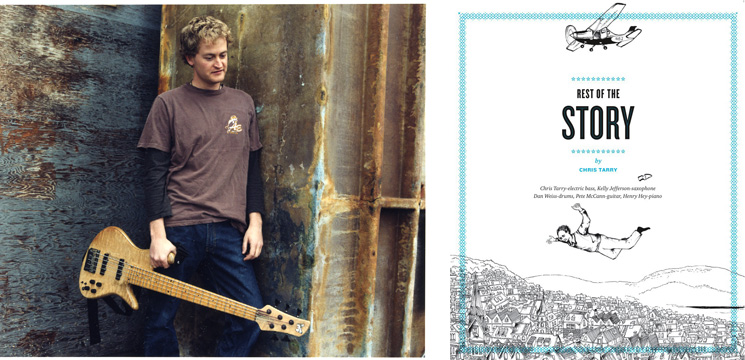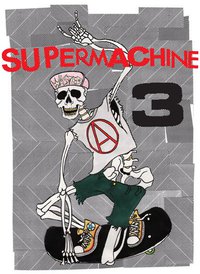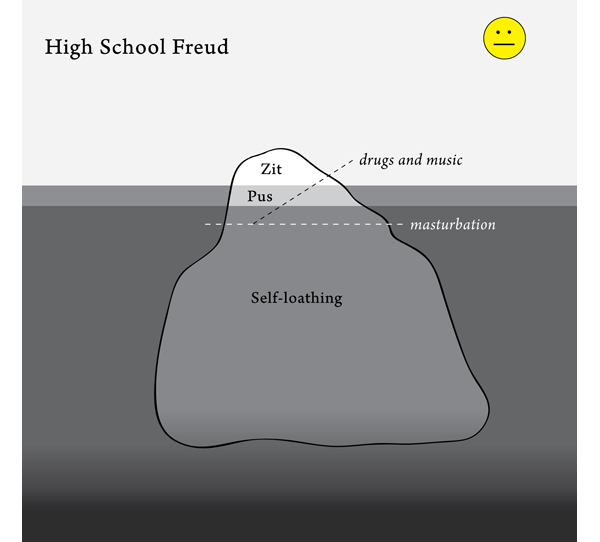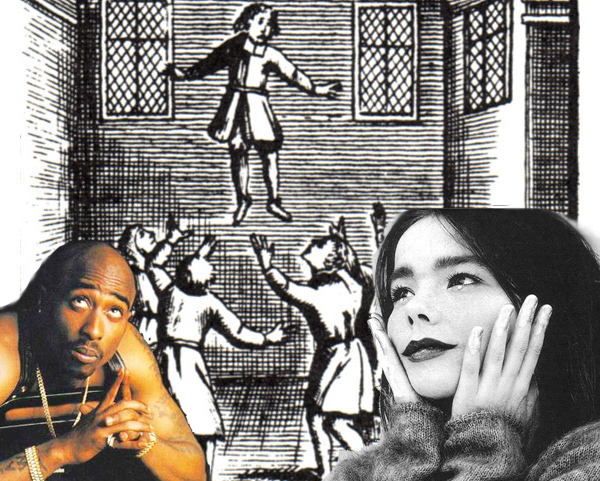Check It Out: The Rest of the Story by Chris Tarry
Sometimes writers really surprise me. Rest of the Story is a short story collection and album by writer and electric bassist Chris Tarry. Actually, Rest of the Story is an album first with nine jazz compositions, then a small collection of fiction containing four really tight, interesting, at times surreal stories. The collection itself is the case for the compact disc containing the album. The album is actually the rest of the story. You have to buy Rest of the Story to understand how awesome the concept and how impeccably it is executed, is but there are some pictures below and here is a short video about the project.
Interview Roundup Part Three: Straub, Lopez, DeLillo, Morrison, Doctorow
 “Even when I was in college, that’s always what my professors would say: ‘your voice is so detached.’ What does that mean? I don’t know! I don’t think you really get to choose the way your voice is on a page. A lot of these stories are extremely internal and that just felt natural to me. What’s supposed to happen in a short story? Is a comet supposed to hit? No! For me, the short stories I really love — not the only stories I love, but the stories I love best — are really, really quiet. They’re about someone just thinking and trying to figure something out. Like Margaret Atwood’s story, ‘Death by Landscape’ — she’s just thinking about her friend going missing at summer camp fifty years ago, but it’s really just an old woman sitting in her apartment. Perfect. I don’t need explosions.” – Emma Straub, in Full-Stop
“Even when I was in college, that’s always what my professors would say: ‘your voice is so detached.’ What does that mean? I don’t know! I don’t think you really get to choose the way your voice is on a page. A lot of these stories are extremely internal and that just felt natural to me. What’s supposed to happen in a short story? Is a comet supposed to hit? No! For me, the short stories I really love — not the only stories I love, but the stories I love best — are really, really quiet. They’re about someone just thinking and trying to figure something out. Like Margaret Atwood’s story, ‘Death by Landscape’ — she’s just thinking about her friend going missing at summer camp fifty years ago, but it’s really just an old woman sitting in her apartment. Perfect. I don’t need explosions.” – Emma Straub, in Full-Stop
“Somehow the same concerns keep coming up. Most of the characters seem to be confused, unsure of how it is they are supposed to live. This reminds me of the wonderful epigraph to Grace Paley’s Collected Stories, which itself is one of my favorite pieces of writing. Ms. Paley relays a story about her friend and colleague in the ‘writing and mother trade.’ She asks Grace a few days before she dies, ‘The real question is, how are we to live our lives?’ The narrators and characters always seem to be entirely baffled by their circumstances. They find themselves put upon and disconnected. They usually cannot account for what has happened to them, let alone how to address the problem(s). Another concern is language and how inadequate it can be. I never consciously set out to write about these issues, but these issues keep coming up.” – Robert Lopez, in Bookslut
 “A novel determines its own size and shape and I’ve never tried to stretch an idea beyond the frame and structure it seemed to require. (Underworld wanted to be big and I didn’t attempt to stand in the way.) The theme that seems to have evolved in my work during the past decade concerns time—time and loss. This was not a plan; the novels have simply tended to edge in that direction. Some years ago I had the briefest of exchanges with a professor of philosophy. I raised the subject of time. He said simply, “Time is too difficult.” Yes, time is a mystery and perhaps best examined (or experienced by my characters) in a concise and somewhat enigmatic manner. Next book may be a monster. (Or just a collection of short stories.)” – Don DeLillo at PEN
“A novel determines its own size and shape and I’ve never tried to stretch an idea beyond the frame and structure it seemed to require. (Underworld wanted to be big and I didn’t attempt to stand in the way.) The theme that seems to have evolved in my work during the past decade concerns time—time and loss. This was not a plan; the novels have simply tended to edge in that direction. Some years ago I had the briefest of exchanges with a professor of philosophy. I raised the subject of time. He said simply, “Time is too difficult.” Yes, time is a mystery and perhaps best examined (or experienced by my characters) in a concise and somewhat enigmatic manner. Next book may be a monster. (Or just a collection of short stories.)” – Don DeLillo at PEN
 “In order to be as free as I possibly can, in my own imagination, I can’t take positions that are closed. Everything I’ve ever done, in the writing world, has been to expand articulation, rather than to close it, to open doors, sometimes, not even closing the book — leaving the endings open for reinterpretation, revisitation, a little ambiguity. I detest and loathe [those categories]. I think it’s off-putting to some readers, who may feel that I’m involved in writing some kind of feminist tract. I don’t subscribe to patriarchy, and I don’t think it should be substituted with matriarchy. I think it’s a question of equitable access, and opening doors to all sorts of things.” – Toni Morrison, in Salon
“In order to be as free as I possibly can, in my own imagination, I can’t take positions that are closed. Everything I’ve ever done, in the writing world, has been to expand articulation, rather than to close it, to open doors, sometimes, not even closing the book — leaving the endings open for reinterpretation, revisitation, a little ambiguity. I detest and loathe [those categories]. I think it’s off-putting to some readers, who may feel that I’m involved in writing some kind of feminist tract. I don’t subscribe to patriarchy, and I don’t think it should be substituted with matriarchy. I think it’s a question of equitable access, and opening doors to all sorts of things.” – Toni Morrison, in Salon
 “I grew up as a New Critic at Kenyon College. It was an historical response, you know, to a real lack of precision in critical thought. It was valuable in drawing attention to the text-in its presumption that the text itself could teach you everything you needed to know about it. I think what you describe as lethargy has more to do with the fact that with the Cold War the entire country, including a large part of the intellectual community, turned right. Domestically, the Cold War at its worst was a kind of civil religion with distinctly Puritan cruelties. People were cowed. It’s true that a generation rose up against the ideology in the 1960s, but by the seventies they were pretty well mopped up. The ranks of the public critics began to thin-the generations behind Edmund Wilson, Irving Howe and Alfred Kazin disappeared into the academy. Fled, one might say. There seemed to be a depoliticization of cultural life, generally. It was clear the USSR was a terrible mistake. But the correlate to that was … that anyone in America who wrote a political novel was writing a foolishly adversarial novel. It was possible according to Cold War orthodoxy to appreciate political novelists like Kundera from Czechoslovakia, or Coetzee or Gordimer from South Africa, but the American political novel was an egregious aesthetic error. A novel about an heroic CIA operative could be a good story… but a novel about a conscientious objector was a political tract.” – E.L. Doctorow, in Weber Journal
“I grew up as a New Critic at Kenyon College. It was an historical response, you know, to a real lack of precision in critical thought. It was valuable in drawing attention to the text-in its presumption that the text itself could teach you everything you needed to know about it. I think what you describe as lethargy has more to do with the fact that with the Cold War the entire country, including a large part of the intellectual community, turned right. Domestically, the Cold War at its worst was a kind of civil religion with distinctly Puritan cruelties. People were cowed. It’s true that a generation rose up against the ideology in the 1960s, but by the seventies they were pretty well mopped up. The ranks of the public critics began to thin-the generations behind Edmund Wilson, Irving Howe and Alfred Kazin disappeared into the academy. Fled, one might say. There seemed to be a depoliticization of cultural life, generally. It was clear the USSR was a terrible mistake. But the correlate to that was … that anyone in America who wrote a political novel was writing a foolishly adversarial novel. It was possible according to Cold War orthodoxy to appreciate political novelists like Kundera from Czechoslovakia, or Coetzee or Gordimer from South Africa, but the American political novel was an egregious aesthetic error. A novel about an heroic CIA operative could be a good story… but a novel about a conscientious objector was a political tract.” – E.L. Doctorow, in Weber Journal
NYers: SUPERMACHINE 3 RELEASE
THIS FRIDAY @ 8
LINE UP:
Sasha Fletcher
Levi Rubeck
Joseph Calavenna
Andrew Gorin
Lily Ladewig
CaConrad
Ben Pease
Ben Mirov
Mark Leidner
Rachel B. Glaser
Kristen Kosmas
(so good!)
Even if you don’t attend because you’re at Blake’s thing, SUPERMACHINE 3 is one of the best single editions of a literary journal I’ve ever read. I went cover to cover and skipped nothing and enjoyed everything. Highly, highly recommended.
Interview Roundup Part Two: Trethewey, Price, Schutt, Gaudry, Glaser
.jpg) “What interests me most about poetry is the elegant envelope of form and the kind of density and compression that a poem demands. Because of those demands, I think I get to work more with silences than if I were writing prose. The silences are as big a part in my poems as what is being said. I believe my poems do a lot of work with what is implicit, rather than what is explicit. I just finished writing a work of creative nonfiction, Beyond Katrina, and I noticed that even in prose I have a strong tendency to circle back; repetition is a thing that I make use of constantly. It seems to me to be more natural in poetry and yet it also appears in my other writing.” – Natasha Trethewey, in Waccamaw
“What interests me most about poetry is the elegant envelope of form and the kind of density and compression that a poem demands. Because of those demands, I think I get to work more with silences than if I were writing prose. The silences are as big a part in my poems as what is being said. I believe my poems do a lot of work with what is implicit, rather than what is explicit. I just finished writing a work of creative nonfiction, Beyond Katrina, and I noticed that even in prose I have a strong tendency to circle back; repetition is a thing that I make use of constantly. It seems to me to be more natural in poetry and yet it also appears in my other writing.” – Natasha Trethewey, in Waccamaw
 “No. I feel that my models came to me pretty early on, and it was who you mentioned—the early 20th century urban writers, like Richard Wright and Hubert Selby and Lenny Bruce—the language of Lenny Bruce. I like that rhythm, that high-speed, free-floating synaptic, anything comes out of your mouth, the acculturation, free-firing cultural riffs. Since then I sort of made my own way and made my own voice. I’ve read books that I admire, but nothing that made me, that taught me how to write.” – Richard Price, in Washington City Paper
“No. I feel that my models came to me pretty early on, and it was who you mentioned—the early 20th century urban writers, like Richard Wright and Hubert Selby and Lenny Bruce—the language of Lenny Bruce. I like that rhythm, that high-speed, free-floating synaptic, anything comes out of your mouth, the acculturation, free-firing cultural riffs. Since then I sort of made my own way and made my own voice. I’ve read books that I admire, but nothing that made me, that taught me how to write.” – Richard Price, in Washington City Paper
 “At eighteen I began reading biographies of writers: where had they gone to school? Were they married, childless, published before age thirty? Were they mad, alcoholic, suicidal, dead at forty? I was not so unhappy growing up that I did not fear the loneliness that seemed to come with being a writer; many of my favorite writers had dispiriting lives, and I wasn’t sure I wanted to suffer if that is what it took, but I did want to write. Suffering comes in many different styles, of course; mine involved years of writing and rewriting paragraphs—typing, deleting, typing again and again before giving in to a watery glue of dialogue. (Writing dialogue most often makes me cringe. Recently, I discovered that verisimilitude or interest can be had in columns of dialogue if every other line is crossed out.) To be embarrassed by a story of one’s own making that dissolves after the first wrought gesture is one way of suffering.” – Christine Schutt, in Prime Number.
“At eighteen I began reading biographies of writers: where had they gone to school? Were they married, childless, published before age thirty? Were they mad, alcoholic, suicidal, dead at forty? I was not so unhappy growing up that I did not fear the loneliness that seemed to come with being a writer; many of my favorite writers had dispiriting lives, and I wasn’t sure I wanted to suffer if that is what it took, but I did want to write. Suffering comes in many different styles, of course; mine involved years of writing and rewriting paragraphs—typing, deleting, typing again and again before giving in to a watery glue of dialogue. (Writing dialogue most often makes me cringe. Recently, I discovered that verisimilitude or interest can be had in columns of dialogue if every other line is crossed out.) To be embarrassed by a story of one’s own making that dissolves after the first wrought gesture is one way of suffering.” – Christine Schutt, in Prime Number.
 “Well, there was a time when I thought Richard Russo and John Irving (and Dickens) were gods — that long, overstuffed narrative exposition was entirely where it was at. I tried to write like those guys throughout my undergraduate and M.A. years. But then I graduated and discovered Blake Butler’s story in Ninth Letter, “The Gown from Mother’s Stomach,” went to his blog, discovered online writing, small presses, venues for innovative writing, writers like Millet and Bernheimer, discovered an entire world of publishing that didn’t give a hoot about the mainstream. I discovered a love of reading short, concise forms — flash fiction and prose poems. I hacked my previous writing to bits, culled the tightest, stand-alone sections, hacked away at them some more, and then suddenly I was publishing. These discoveries led to my breakthrough, surely.” – Molly Gaudry, in Hobart
“Well, there was a time when I thought Richard Russo and John Irving (and Dickens) were gods — that long, overstuffed narrative exposition was entirely where it was at. I tried to write like those guys throughout my undergraduate and M.A. years. But then I graduated and discovered Blake Butler’s story in Ninth Letter, “The Gown from Mother’s Stomach,” went to his blog, discovered online writing, small presses, venues for innovative writing, writers like Millet and Bernheimer, discovered an entire world of publishing that didn’t give a hoot about the mainstream. I discovered a love of reading short, concise forms — flash fiction and prose poems. I hacked my previous writing to bits, culled the tightest, stand-alone sections, hacked away at them some more, and then suddenly I was publishing. These discoveries led to my breakthrough, surely.” – Molly Gaudry, in Hobart
“Yes, the Pee On Water title has been troubling from before Adam Robinson. At my thesis defense, all three of my advisors advised me strongly against it. For a while, it seemed like people younger than 30 liked it, and people older than 30 did not. For a few weeks I tried to find a title to replace it, but I had been calling the bookPee On Water in my head from the time I first wrote that story, so it was a strong instinct to override.” – Rachel B. Glaser, in Rumble Magazine
On Fandom and Aliens Remaking the World
I am interested in the concept of fandom. Do you have a “fan” kind of relationship with the things you love? I feel like I have a very fan kind of relationship with the things I like, even if the people who make them are “nobodies” to society. I am a fan of random people, people who make beautiful things, people that have what I call the 6th sense—which is a special kind of perception, a special way of seeing or knowing. For example, Bhanu Kapil. I have a list of suspected “aliens”—passionate people that possess certain qualities. Bhanu is on it. Eileen Myles is on it too—I could listen to her talk all day because it’s always like wandering through a very fascinating and specific brain. I guess I don’t understand casual people—people that get enough sleep, people that are regular (as in consistent), people that find it easy to make new friends….
The epic poem that I wrote recently was about trying to find the lost aliens of planet earth, crisscrossing the country on foot in search of the other alien beings. Actually, most of the poem is about obsessively trying to escape through a crack in the sky until I am told by Tupac, who lives in the kingdom in the sky, that I should not try to ascend but should focus on my world—on “this worldliness.” That’s when I start trying to find the lost ones. I chose Tupac because my brothers and I were such big fans as children, and still to this day I think of him as a dynamic figure—tough and sensitive with radical and intellectual tendencies. So Tupac tells me I’ve got it all wrong. He encourages me to redirect my vision. I listened. I stumble upon a mysterious post office in Wyoming that has rows and rows of open postal boxes and I leave letters in the mailboxes knowing that the lost aliens of planet earth are the ones who will reply. We find each other and sing a note real loud and blast all of the beings that are ready to make the new world into the sky. As I am ascending Bjork is below me wearing a big dress while looking at me with tears in her eyes because she is so moved (I was a very big fan of Bjork growing up). One by one, we cross over into a crack that opens in the sky.
It’s International Women’s Day 2011!
 What follows is a list of writers who amaze me.
What follows is a list of writers who amaze me.
Locals: Roxane Gay • Evelyn Hampton • Lily Hoang • Kristen Iskandrian • Catherine Lacey • Chelsea Martin • Amy McDaniel • Alissa Nutting • Alexis Orgera • Jackie Wang
Notables: Amelia Gray • Aimee Bender • Judy Budnitz • Trinie Dalton • Christine Schutt • Jac Jemc • Lydia Millet • Catie Rosemurgy • Claire Donato • Renata Adler • Leni Zumas • Eudora Welty • Eileen Myles • Amber Sparks • Flannery O’Connor • Joyelle McSweeney • Jackie Corley • Patricia Highsmith • Ellen Bryan Voigt • Mary Ruefle • Myla Goldberg • Karen Russel. Carolyn Chute • Kathrine Dunn • Mary Miller • Kate Walbert • Amy Hempel • Amanda Filipacchi • Tillie Olsen • Joanna Howard • Claudia Smith • Melissa Broder • Grace Paley • Katherine Anne Porter • Pagan Kennedy • Suzanne Burns • Victoria Blake • Sandy Florian • Shirley Jackson • Emily Dickinson • Marcy Dermansky • Lorrie Moore • Kate Bernheimer • Alice Munro • Kim Chinquee • Francine Prose • Janet Frame • Brandi Wells • Robin Romm • Mary Robison • Antonya Nelson READ MORE >
Al Burian US reading tour
I recently caught up with Al Burian in Berlin to record a podcast and I realized that I should let all of you know that you should not pass up the chance to see Al Burian read if he is rolling through your city on his upcoming reading tour. Seriously. I’ve seen him read several times and he’s always delivered. Tell him Jackie sent you.
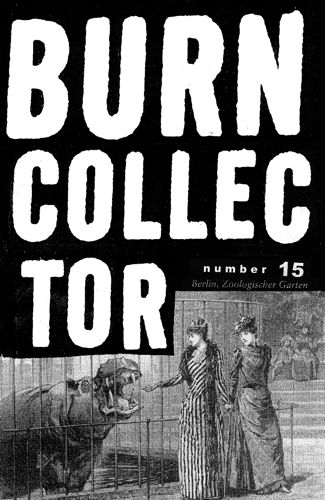
NEW PUBLICATIONS BY AL BURIAN
BURN COLLECTOR #15 will be out in March, published by Microcosm.
http://microcosmpublishing.com
March will also see the release of OK, OK, You Smote Me, a short story in zine format, available exclusively from Quimby’s bookstore of Chicago.
READINGS
March 12 Bookthugnation, Brooklyn NY
March 13 Molly’s Book Store, Philadelphia PA
March 15 Towson University, (near Baltimore) MD
March 17 Sugar City, Buffalo NY
March 22 Quimbys, Chicago IL
March 25 Chicago Zine Fest
March 8th, 2011 / 4:36 pm
The David Shields Interview (Paperback Edition)
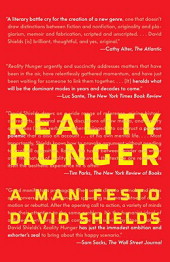 Flaubert claimed: “The value of a work of art can be measured by the harm spoken of it.” Reality Hunger, by David Shields, was one of the most controversial and talked-about books of 2010, reviewed nearly everywhere. Shields debated with journalists, writers, and artists such as Nicholson Baker, Simon Critchley, Leonard Lopate, John Cameron Mitchell, Rick Moody, Michael Silverblatt, Zadie Smith, DJ Spooky, Judith Thurman, and Simon Winchester. This past February saw the paperback release of Reality Hunger. Recently I met with Shields to analyze the polemics and decipher the carnage.
Flaubert claimed: “The value of a work of art can be measured by the harm spoken of it.” Reality Hunger, by David Shields, was one of the most controversial and talked-about books of 2010, reviewed nearly everywhere. Shields debated with journalists, writers, and artists such as Nicholson Baker, Simon Critchley, Leonard Lopate, John Cameron Mitchell, Rick Moody, Michael Silverblatt, Zadie Smith, DJ Spooky, Judith Thurman, and Simon Winchester. This past February saw the paperback release of Reality Hunger. Recently I met with Shields to analyze the polemics and decipher the carnage.
CALEB POWELL: The constructive response to Reality Hunger drowned, at times, amidst negative reviews. Walter Kirn said that he was “amused to see some of the hysterical reactions it’s provoked.”
DAVID SHIELDS: About negative reviews, the book is called a manifesto. It’s raison d’etre is to generate discussion. To provoke. I cannot object to any fiercely critical review. One reviewer said, “The discussion surrounding the book is more interesting than the book itself.” Well, what generated the discussion? My book.
CP: In their reviews…James Woods defended the traditional novel, and Michiko Kakutuni attacked.
DS: Neither of them talked about the book, they just mention it in passing. They are total spear carriers for conventional fiction…neither remotely engage with the argument. They mulch in a kind of drive by…Woods said something like…it’s good to be reminded of these arguments but Shields needs to define his terms better. Michiko called it “deeply nihilistic,” that’s so…
CP: It’s not the sharpest comment…it reads as hyperbole. I mean, you say the novel is worthless, but you praise a lot of art.
DS: She…and Woods, they are the megaphones of conventional fiction. The New York Times and The New Yorker, highly venerable institutions, whatever…they articulate nineteenth century conventional fiction…are you a Franzen fan?
Interview Roundup Part One: Atwood, Abani, Bernheimer, Yoon, Lavender-Smith.
 “So a lot of the things in my books are going to be your problems. They’re not my problems because I will be dead. So maybe I’m writing my books for you. That’s a scary thought, isn’t it?” – Margaret Atwood, in The National
“So a lot of the things in my books are going to be your problems. They’re not my problems because I will be dead. So maybe I’m writing my books for you. That’s a scary thought, isn’t it?” – Margaret Atwood, in The National
 “It’s also important to say that I don’t write to find answers to anything—that’s just not the way I am, in my fictions and in my life. Questions don’t necessarily mean answers. It is more about seeing. Some kind of glimpse that helps me think about, say, why in peacetime American fighter planes dropped bombs on a Pacific island that was used by fishermen. Who those fishermen were, where they were from, who loved them, who they loved. Or why a man seems to grow more sad with his marriage and his own achievements in life as this island, his home, flourishes around him. These kinds of questions are endless, of course, and I think a part of me could have written about Solla forever. But I can now see the larger canvas of that place and the dark places aren’t so dark anymore.” – Paul Yoon, in The Rumpus
“It’s also important to say that I don’t write to find answers to anything—that’s just not the way I am, in my fictions and in my life. Questions don’t necessarily mean answers. It is more about seeing. Some kind of glimpse that helps me think about, say, why in peacetime American fighter planes dropped bombs on a Pacific island that was used by fishermen. Who those fishermen were, where they were from, who loved them, who they loved. Or why a man seems to grow more sad with his marriage and his own achievements in life as this island, his home, flourishes around him. These kinds of questions are endless, of course, and I think a part of me could have written about Solla forever. But I can now see the larger canvas of that place and the dark places aren’t so dark anymore.” – Paul Yoon, in The Rumpus
 “I truly believe that writing is a continuum—so the different genres and forms are simply stops along the same continuum. Different ideas that need to be expressed sometimes require different forms for the ideas to float better. I don’t write essays as often as I should.” – Chris Abani, at Utne Reader
“I truly believe that writing is a continuum—so the different genres and forms are simply stops along the same continuum. Different ideas that need to be expressed sometimes require different forms for the ideas to float better. I don’t write essays as often as I should.” – Chris Abani, at Utne Reader
 “I think, as Nabokov did, that ‘all great novels are great fairy tales,’ and then some. If you show me a book – a novel, a story collection, a collection of poems, a series of one-act plays, a screenplay – in any style from mainstream to experimental – I will show you the fairy tales in it. I can find not only the influence of fairy tales, but how fairy tales have given the narrative shape.” – Kate Bernheimer, in Room 220
“I think, as Nabokov did, that ‘all great novels are great fairy tales,’ and then some. If you show me a book – a novel, a story collection, a collection of poems, a series of one-act plays, a screenplay – in any style from mainstream to experimental – I will show you the fairy tales in it. I can find not only the influence of fairy tales, but how fairy tales have given the narrative shape.” – Kate Bernheimer, in Room 220
 “First, it’s hard for me to say that I ‘expect’ a reader to do anything. (Although the book does posit an imaginary reader, a construction which seems to issue from my neuroses.) But I believe there are a number of things a reader might do with entries such as those: she might be compelled to project a narrative from the fragment; she might be compelled to gather these fragments so to project an intellectual persona for their author; or she might be compelled to mine these fragments for clues, for something like the shadows of a narrative that isn’t explicitly presented by the book, a narrative whose protagonist is named Evan Lavender-Smith. Or she might perform some combination of these three operations. Or she might slam the book closed. In any case, part of my intention in constructing a book out of a seemingly haphazard collection of notes was that these notes, by virtue of their accumulation and juxtaposition and patternation, would end up working overtime (not unlike what we might expect of the bits and pieces of a conceptual art). The tenor of that extra work would, ideally, be unnameable, too complex to pin down; just as the tenor of great allegorical writing constantly eludes the grasp of full understanding and interpretation.” – Evan Lavender-Smith, in The Faster Times
“First, it’s hard for me to say that I ‘expect’ a reader to do anything. (Although the book does posit an imaginary reader, a construction which seems to issue from my neuroses.) But I believe there are a number of things a reader might do with entries such as those: she might be compelled to project a narrative from the fragment; she might be compelled to gather these fragments so to project an intellectual persona for their author; or she might be compelled to mine these fragments for clues, for something like the shadows of a narrative that isn’t explicitly presented by the book, a narrative whose protagonist is named Evan Lavender-Smith. Or she might perform some combination of these three operations. Or she might slam the book closed. In any case, part of my intention in constructing a book out of a seemingly haphazard collection of notes was that these notes, by virtue of their accumulation and juxtaposition and patternation, would end up working overtime (not unlike what we might expect of the bits and pieces of a conceptual art). The tenor of that extra work would, ideally, be unnameable, too complex to pin down; just as the tenor of great allegorical writing constantly eludes the grasp of full understanding and interpretation.” – Evan Lavender-Smith, in The Faster Times

